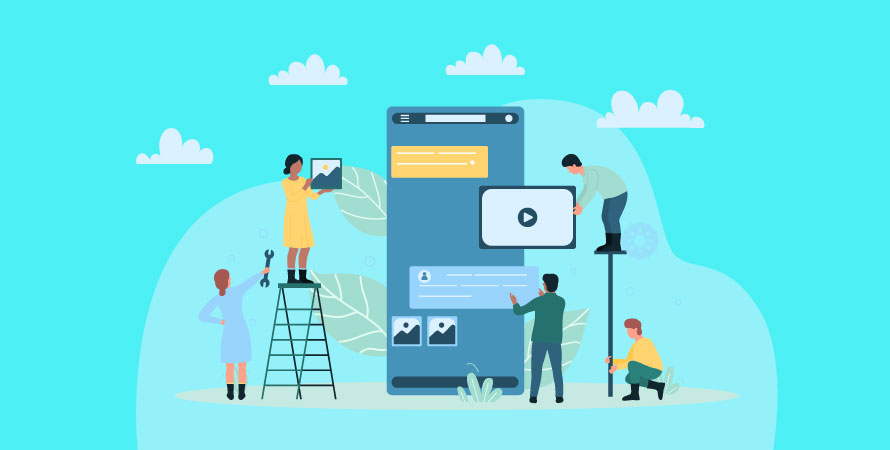How much does it cost to hire an Android App Developer?

Determining the cost of hiring an Android App Developer is a pivotal step for businesses aiming to tap into the mobile market, which boasts billions of active users. It is a crucial step to hire Android app developers who can transform your app idea into a functional and user-friendly product. This article serves as a comprehensive guide to understanding the financial implications of hiring app developers.
In this blog, you will learn about how much do app developers make. The key factors that influence hiring costs, from app complexity and design intricacy to geographical location.
By the end of this exploration, you will be equipped with the knowledge to set realistic budget expectations and make informed decisions that balance cost with quality in your quest for Android app development expertise.
Understanding the Key Factors Affecting the Cost of Hiring
The process of hiring Android developers includes several factors that directly influence the financial investment required. These factors must be evaluated to ensure alignment with project goals and the app development process.
Acknowledging these factors affecting cost when hiring app developers in India is crucial for making informed decisions. These factors align with both project vision and fiscal feasibility:
1. App Complexity
The complexity of an app is a primary determinant of development costs. Simple apps with basic functions are less expensive, whereas complex applications featuring advanced technologies like machine learning or augmented reality require more time and expertise, thus increasing the cost.
2. Scope and Focus
The overall scope, encompassing features, user base, and intended market play a crucial role in determining cost. A broader scope often necessitates a larger team and longer development time.
3. Budget Considerations
Establishing a clear budget from the outset helps steer the direction of development. It’s essential to balance financial limitations with desired outcomes to avoid extending resources.
4. Functionality Requirements
Specific functionalities such as real-time data synchronization, third-party integrations, or unique user interactions can significantly impact the price due to the additional complexity they introduce.
5. Design Intricacy
Aesthetic aspects like custom animations or intricate UI/UX designs are vital for user engagement but can add to the cost due to the detailed work required.
Exploring Different Hiring Options: Outsourcing vs. Local Hiring for Android App Development
When choosing how to hire an application developer or app designer near me, the debate often centers around outsourcing vs. hiring locally, each with its distinct pros and cons.
Benefits of Outsourcing App Development Overseas
- Cost Reduction: Typically, developers from regions like Southeast Asia offer competitive rates compared to their North American or Western European counterparts, allowing businesses to allocate funds more efficiently.
Risks of Outsourcing
- Language Barriers: Communication can be a challenge, potentially leading to misunderstandings about project requirements or expectations.
- Scams: There’s an increased risk of encountering fraudulent entities when venturing into global markets without proper vetting.
Advantages of Hiring Locally
- Communication: Sharing the same language and time zone facilitates clearer and more timely interactions between clients and developers.
- Collaboration: Proximity allows for face-to-face meetings, fostering a collaborative environment that can enhance both the development process and the end product.
Freelancer vs. Agency vs. In-house Team: Choosing the Right Resource for Your Android App Project
When starting an Android app project, choosing the right development resource is a critical decision that can impact outcomes and overall success. There are three main options to consider in an app developer hire process. They include hiring a freelance app programmer, finding an app developer, or building an in-house team. Each option has its own advantages and challenges.
Pros and Cons of Hiring a Freelancer as an App Developer
Each hiring scenario holds unique implications for your Android app’s timeline, budget, and quality. Here, you will come to know how much does an android cost. Identifying which model aligns best with your business strategy is crucial for the successful execution of your app development project.
Pros:
- Cost-Effectiveness: Freelancers often have lower overhead costs than agencies or in-house teams, potentially offering more competitive rates.
- Flexibility: Freelancers can usually adapt to your schedule, allowing for more agile project adjustments.
- Diverse Skill Sets: You can select freelancers with specific skill sets tailored to your project needs.
Cons:
- Limited Resources: Freelancers may juggle multiple projects, which can affect their availability and attention to your project.
- Varied Quality Assurance: The lack of a supervising team may result in inconsistencies in quality unless properly managed.
- Communication Constraints: Working across different time zones or with limited communication channels can pose challenges.
Benefits of Working with an Agency
Pros:
- Full-service Solutions: Agencies provide comprehensive services from design to development and testing, ensuring a cohesive approach.
- Scalability: With a team of professionals at hand, agencies can handle projects of varying sizes and complexities.
- Accountability: Established processes within agencies often lead to higher reliability and accountability for project outcomes.
Cons:
- Higher Cost: The breadth of services and expertise comes at a premium price compared to freelancers.
- Less Direct Control: Clients may have less direct oversight over who is working on their project within the agency.
Advantages of Having an In-house Team
Pros:
- Dedicated Focus: An in-house team will be fully invested in your company’s vision and goals, leading to better alignment with business objectives.
- Immediate Communication: Proximity allows for real-time collaboration and decision-making.
- Long-term Investment: Building a team creates assets for ongoing maintenance and future projects.
Cons:
- Substantial Overhead Costs: Salaries, benefits, workspace, and equipment contribute significantly to expenses.
- Recruitment Time and Costs: Finding the right talent requires time and resources that could delay project commencement.
Hidden Costs to Watch Out for When Hiring an Android App Developer
Identifying these Android app development costs early on helps in creating a more accurate budget forecast. This foresight enables businesses to allocate resources efficiently and avoid unexpected financial strain during the development lifecycle.
When budgeting for an Android app development project, it’s crucial to consider not just the apparent costs but also the hidden costs that can arise. These unexpected expenses can significantly impact the overall budget if not accounted for from the beginning.
1. Equipment/Software Licenses
Developers will need access to specific tools and software to create your Android developer app. These may include Integrated Development Environments (IDEs), graphic design software, and testing platforms. Some of these require licenses that could incur a substantial cost, particularly for specialized or high-end products.
2. Potential Rework/Revisions Costs
The development process is iterative, and changes are often necessary as the app evolves. Revisions can result from feedback, testing, or altered requirements. While some rework is usually included in initial quotes, extensive revisions could lead to additional charges.
3. Team Collaboration Tools
Collaboration and project management tools are essential for keeping track of progress, especially with dispersed teams or remote developers. Whether it’s services like Slack, JIRA, or Asana, these tools have subscription fees that add up over time.
Average Hourly Rates of Android App Developers in Different Regions
Discovering the average hourly rates for an Android app developer is critical for budget planning. These rates can fluctuate widely depending on the region where the developer is based. Here’s a breakdown:
Southeast Asia
Developers in countries like Vietnam, Thailand, and the Philippines offer competitive rates ranging from $10 to $40 per hour.
Eastern Asia
In tech hubs such as China, South Korea, and Japan, hourly rates vary between $20 to $60.
Eastern Europe
Nations including Poland, Ukraine, and Romania have developers whose rates are typically set at $30 to $50 per hour.
Oceania
Australian and New Zealand developers tend to charge between $40 to $70 per hour.
Middle East
The region presents a range of $40 to $70 per hour, with countries like Israel at the higher end of this spectrum.
Western Europe
Developers from countries such as Germany, France, and the UK command rates of $80 to $100 per hour.
United States
With a high demand for tech talent, US-based Android app developers have higher rates that can go from $120 to $150 per hour.
These figures serve as a general guide; individual developer experience and expertise can cause variations within these ranges. Accurate budgeting also requires considering other project elements beyond regional hourly rates.
App Development Cost Benchmarks for Different Levels of Complexity
When planning to develop an Android app, it is vital to establish a budget that aligns with the desired level of complexity. Here are the app development cost benchmarks:
1. Simple App
- A simple app typically includes basic functionalities like user login, a list view, and simple navigation.
- Development costs range from $16,000 to $32,000.
- These apps require fewer hours of development and minimal backend services.
2. Medium Complexity App
- This category may encompass apps with more sophisticated features such as integration with APIs, custom UI/UX designs, and mid-level data processing.
- Costs are generally between $32,000 and $48,000.
- The increased complexity requires additional time for development and testing.
3. Complex App
- Complex apps can include advanced interactions such as real-time synchronization, custom animations, complex back-end with database relationships, or high levels of security compliance.
- Development expenses can soar above $72,000.
- Such projects demand extensive expertise and longer timeframes to ensure quality and performance.
Conclusion
Choosing the right candidate for your Android app development is a delicate balance between cost and quality. The ideal scenario involves a developer or team that aligns closely with your project’s needs, understands the nuances of Android platforms, and falls within your budget without compromising on the end product’s quality.
A well-informed decision on hiring an Android app developer will pave the way for a successful application that resonates with users and stands out in the competitive market.


